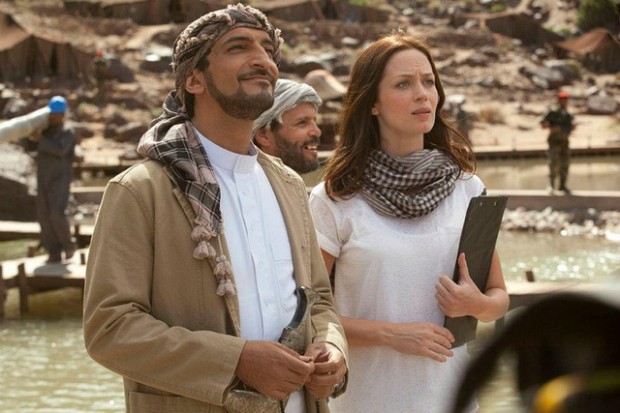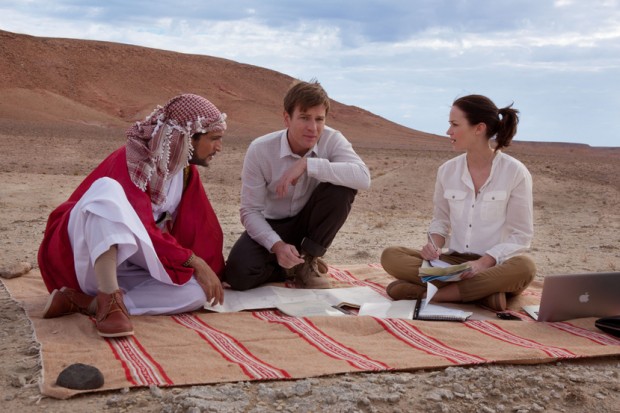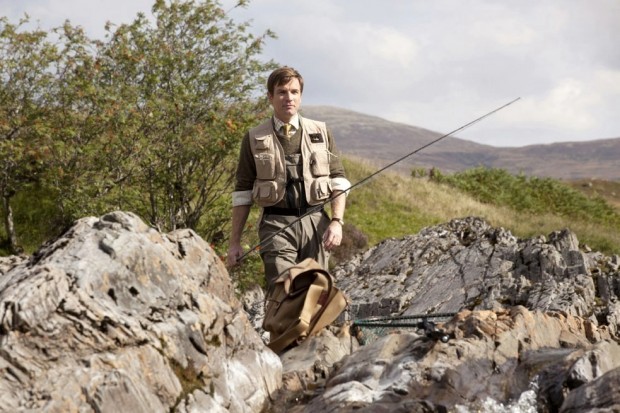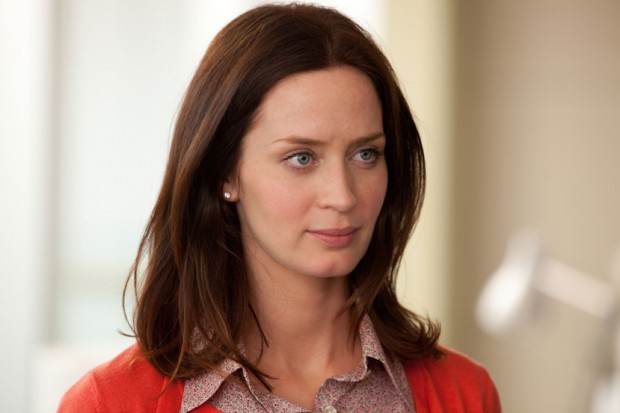
Winning an Oscar is a life-changing event, even as we all acknowledge how silly it all seems. When Simon Beaufoy, the Academy Award-winning screenwriter of Slumdog Millionaire discusses his craft, one tends to listen. I was afforded such an opportunity recently, as Simon sat down with myself and a few other journalists to discuss his latest film, Salmon Fishing in the Yemen, his directorial past and future ambitions, the daunting task of adapting Catching Fire, the second book in The Hunger Games series, and his next possible project with director Slumdog and 127 Hours helmer Danny Boyle. The following is a transcript of interview questions asked by myself and other journalists at a recent roundtable session with the writer.
So this project, you adapted from the book, and the book is written in a very unconventional style.
It’s an epistolary novel, like Dracula.
A lot of people look at a book at that and think it’s not a movie, per se. My question is what would make you look at a possible source material and think “I can’t crack this” or “this format doesn’t work as a movie?”
That’s a really good question. I just fail to stop myself from adapting something. I got to a stage where I couldn’t read a book without thinking, “oh, I know what to do with this….” It’s really off-putting. So I started reading poetry, [thinking], “that’s fine. There’s no way I’m going to have that part of my head going ‘oohh, there’s a movie.’ ” And I just started adapting an epic poem into a script. So that didn’t work at all. It’s a poem called “Sharp Teeth,” which is a really fabulous piece of work.
The more difficult it is, the more interested I get, frankly. But I hoped I wouldn’t be thinking that way when I was reading poetry, but suddenly I did. It’s such a cinematic piece of work. And I’ve adapted something called “The Rorschach Text” which is completely weird and impossible.
I just love adapting material that allows room for creativity and allows room for me to be very present in the process, I suppose. Sometimes when you’re adapting something classic and famous you have to adopt a different attitude, to something like Salmon Fishing where it had such an unusual narrative and such an unusual structure, that you got quite a free reign to do interesting things with it. And it’s the challenge of it.
I love the challenge of looking at something and thinking, “how on Earth do you crack this particular Rubik’s Cube?”
 How many treatments did you do? Do you like to share your work with another colleague? Do you like to have a lot of feedback?
How many treatments did you do? Do you like to share your work with another colleague? Do you like to have a lot of feedback?
No, no, I try and do as little outline or treatment work [as possible]. I have a roughly three-page document, something very short, to prove to myself that the story has a beginning, middle and end. After that, I just start writing and see where it takes me.
Do you write in order?
I try to, but when I get stuck I’ll write something out of that order. Otherwise it’s very easy to get to a place where you just stop, and I’ve learned that, when you get there, to just leave it and skip to something you do know how to do, even if it’s way further down the line. Then your subconscious is busy helping you out somewhere.
How long does your writer’s block affect you?
Never for very long. There are always knots in a script where you think I just don’t know how to get all these elements to work together. But I’m never at a stage…. The thing I’ve found to do is to never stop and try and solve it, but to move on or to move back to another part of the script. Or move to the end of the script, and say, “I want to end it like this” so that will then inform the decision I make here.
Do you have a writing routine?
No, I wish I did. (laughs) I’d love to be a kind of Ernest Hemmingway: three gin and tonics before breakfast then eight hours of writing then shoot a buffalo. No, it’s a mess, just a mess. I just write when I can and the children will come in and say, “can we do something interesting? Stop being boring at your computer….” No, it’s not a tidy process.
It’s always a miracle when I get to the end of something. Just think, “well gosh, it actually makes sense!”
But you do it every day?
Pretty much, yeah. Yeah. It’s a sort of strange habit that one needs to keep feeding.
With both main characters and how careful both of their arcs are throughout the whole story, do you see that in a scene-by-scene basis, or does it sort of happen organically?
No! No. Everyone talks about “tracking” and I don’t really understand any of that. I just…. Just work it out. There’s something organic about a good story and they have their own particular journeys they go on. You can just read and go, “well there’s too much happening too early there with those two, so we’ll just have to turn that down a bit.” It’s all about modulation, I think.
Were you afraid that these feelings of infidelity, or something like it, could burden the story in some way?
I think it’s about being true to yourself and sometimes that’s really hurtful to other people. To me, the character Fred was very unhappy in his relationship, and if one of the people is unhappy in a relationship than the other one will be unhappy by the nature of relationships.
He wasn’t really doing anyone any favors by keeping the blinkers on and going, “I’m not even going to examine if I’m happy or not. I’m married, I have a job, that’s what I will do until I retire.” And something in your life comes along and says, “no, you have to look at these things, whether you like it or not.” If you then look at your life and think, “I’m not being true to who I really am,” then you have to make some difficult decisions.
I wouldn’t say he was being unfaithful exactly. He wasn’t being sexually unfaithful. He was just leaving an unhappy marriage, and that causes a lot of pain.
They don’t even kiss, do they?
(smiles). They don’t, you’re right. No. It’s quite chaste in that respect.
– Have you been satisfied by Lasse Holmström’s work?
Yeah. My Life as a Dog is one of my favorite films. Lovely film. He’s got a great warmth. He’s a very generous human being, and you can feel that in the film.
You’re currently adapting Catching Fire, which is kind of a huge undertaking.
I didn’t realize that. (laughs) I do now!
I wanted to know how much they wanted you to stick to the source, how much freedom you had to translate it.
I’m still at the very early stages at that. It’s a real challenge. I’ve been told I’m not allowed to talk about it at all. It’s a real challenge because [it has] a very faithful fan base that you have to treat with great respect. At the same time, you have to do your job as an adapter, which means you just can’t transpose the book wholesale to the screen. That won’t make a good film. So somehow you have to juggle that.
Were you familiar with the books?
Yeah, I was. Yeah, they’re very big in Britain. I [just] didn’t quite realize how big. It seems to be extraordinary. I mean, I’ve only gathered this week the buzz about it. It’s huge.
Film professors always say to screenwriting students that they should direct their own films because the screenplay is 80% of the movie and why give it to a director to get all the credit and see his vision of your movie. What do you think about that? Do you like to direct more?
I have directed before. It’s a different part of your brain, I’ve found. When you’re on set, a director just has to make decisions all day, answering questions all day. And they’re just fired at you, nonstop. “Pink lipstick or purple lipstick? Do you want the hair up or hair down? Do you want the light there or the camera here? What lens?” And the good directors go, “purple lipstick, hair up, camera there, lights there” where as the writer in me goes, “hmmm…. That’s really interesting. Can I think about that?” And the hair person goes, “no. I need to do it right now.”
It’s a very different part of your brain working and I suspect the writer part of my brain is better than the director part. I could do it, but I wasn’t…. When you see someone like Danny [Boyle] directing, his entire being goes into it. There’s no part of his DNA that isn’t directing that film. Whereas when I directed, I directed my script and I was doing due diligence to the piece of work that I created, and that doesn’t necessarily make the best film.
Will you work with Danny again?
Oh I’d love to, yeah. We’ve got plans.
I read that the “Sharp Teeth” project was one of them for a possible collaboration.
Well we’re talking about it, but that’s quite [in the] early days as well. Nothing certain. It’s gotta be a really good script first and then we’ll see. But I’d love to work with Danny. He’s a wonderful person to work with. Very collaborate, and yet, at the same time, has a completely individual vision of the material.
Do you sometimes work on two different projects at the same time?
All the time, yeah! It’s terrible. It’s a real mistake. I’ve got the stage play of The Full Monty that I’m doing at the moment, at the same time as various other projects. Catching Fire is the number one priority, but other stuff bubbles along. That’s the problem with films: they never happen when they’re supposed to. [They] disappear into someone’s desk for months and no one seems interested then suddenly an actor will say, “I want to do this” and suddenly it’s on again. So they’re all at different stages. It’s like having a family. Some need more attention at different times than others.
How do you manage to jump in your head and keep one project from another?
(laughs) I don’t know. It’s not a tidy process, no. They all have their own worlds. Everything I do [is] character based. I used to be a documentary maker so I’ve always been interested in characters. They come first, the characters, so they occupy their own little world in my head. It’s not actually that difficult to go from a bunch of overweight male strippers in Sheffield to people running around an arena killing each other in Catching Fire. [The process is] like taking a flight from LA to New York; different groups of people.
As a writer, is there a point where you’re so emotionally involved in getting a script together and making it right and you have to turn it over to a director. Do you have to detach yourself from it, or are you still emotionally involved with the material?
That’s interesting. As I get older, I know I’m supposed to be more detached (laughs). I’ve been _told_ as I get older I should get more detached. But you don’t. You get really involved with it, and if you’re doing a good job it’s really hard to do a clinical piece of work. So yeah, I always get involved. And I’ve been lucky enough to always work with directors who want me to stay involved, which is a really nice part of the process. Always love going back into the edit room. Being on set isn’t very interesting cause you’re the only one not doing anything.
Are you on set the whole time?
No, I tend not to be. You’re the guy everyone goes, ‘who’s he? And why’s he here? Why’s he eating sandwiches? And can he move a bit out of shot, please!’ There’s nothing to do. If you’ve done your job properly, they’re all doing what they should. And given that you’ve spent three years writing it, it’s a real mistake to start changing things on the day. And if you happen to be much around on set, actors start saddling up, [saying], ‘this line here, I’m not sure about it.’ And if you’re not there, they just say it, and they nearly always say it right.
But in the edit room I’m there a lot, because that’s sort of like writing. Again, just with the material rather than the words. I’ve always been really lucky. I hear horror stories from various friends of mine who work with directors who don’t want them around and ban them from the cutting room. I’ve always had a really good relationship with my directors. It’s such a collaborative process that I think it can be really helpful to have the writer [around] considering you’re the person who started the process. You could be really helpful all the way through.
Are there any specific past writers who have inspired you?
There were more filmmakers rather than screenwriters that really inspired me, actually. The people who were doing the BBC “Play For Today” [series], and the “Wednesday Play” were kind of institutions. People like Ken Loach, who also came from a background that was very naturalistic, right on the edge of being documentary. They were the big inspirations for me, really. There’s a whole gang of them, really. Him and Alan Plater, Tony Garnett, all fiercely intelligent, politically-committed filmmakers as well. Very interesting bunch.
Salmon Fishing in the Yemen is in now in limited release.






